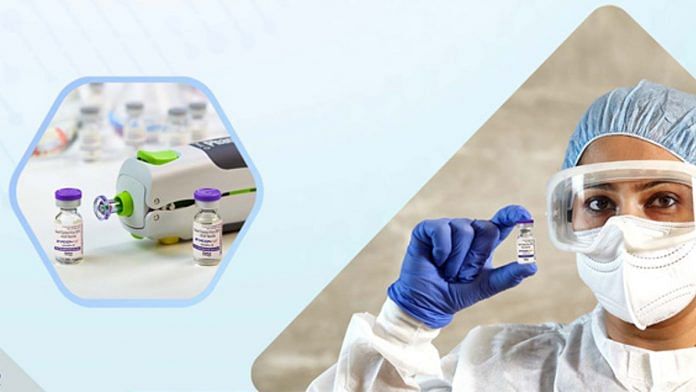New Delhi: With the first instalment of 1 crore doses of ZyCov-D, the world’s first DNA vaccine against Covid, expected next month, India has started training vaccinators to administer the shot. ZyCov-D, manufactured by Zydus Cadila, is administered using a needle-free applicator.
Top sources in the health ministry told ThePrint that this first instalment of the vaccine, currently the only one approved for use in minors in India, is expected “either by the end of this month or next month”.
Zydus Cadila plans to manufacture 10-12 crore doses of ZyCoV-D annually, though price negotiations with the government are still on.
The vaccine has been cleared for use on people as young as 12 years old, but ministry officials say there are no plans as yet to reserve it for children. Instead, it could be added to the existing vaccine basket for adults, which currently has Bharat Biotech’s Covaxin, AstraZeneca’s Covishield and Russia’s Sputnik V.
“Price negotiations are still on with the company. But simultaneously, in partnership with them, we have started training vaccinators to administer the vaccine. This is not an injectable vaccine, so it is a little different. Vaccinators need to learn it. It is not a difficult process, it is just a day’s training and while the initial number of doses may not be that many, they will go to all states and Union territories. So, all vaccinators will have to undergo the training before it is introduced into the national programme,” a senior health ministry official told ThePrint.
According to the US Centers for Disease Control (CDC), a needle-free applicator or a jet injector pressurises liquid medication, forcing it through a nozzle orifice into a narrow stream capable of penetrating the skin to deliver a drug or vaccine into intradermal (in the skin), subcutaneous (under the skin), or intramuscular tissues (tissue connecting muscles).
Zycov D is a three-dose vaccine which will be administered on day zero, day 28 and on day 56.
In a statement on 20 August, after Zycov D received emergency use authorisation in India, the manufacturer had said: “ZyCoV-D, is a needle-free vaccine administered using The PharmaJet® a needle-free applicator, which ensures painless intradermal vaccine delivery. This is for the first time that a technologically advanced vaccine has been successfully developed on the Plasmid DNA platform for human use. The platform, because of its rapid plug-and-play technology, can be easily adapted to deal with mutations in the virus, such as those already occurring.”
Also read: ZyCov D is 66% effective against Delta variant of SARS-Cov-2, claims Zydus Cadila
Needle-free technology
According to information available on Pharmajet website, the needle-free applicators are preferred by patients and healthcare workers as well as the CDC as it reduces both the risk of needle injuries to vaccinators and also the necessity of sterilisation to prevent transmission of infections.
“Jet injectors prevent needle-stick injuries to health-care providers and can overcome improper, unsterile reuse and other drawbacks of needles and syringes in developing countries,” CDC says.
The Pharmajet website says: “The PharmaJet Stratis® Needle-Free Injection System is intended to deliver various medications and vaccines either intramuscularly or subcutaneously by means of a narrow, precise fluid stream, which penetrates the skin and delivers the medicine or vaccine to the body. Healthcare providers who routinely administer injections may use the PharmaJet Needle-Free Injection System. It may be used for adults and children. It can also be used by patients authorized by their physicians to self-inject, or to have other individuals administer injections of prescribed medication.”
(Edited by Manasa Mohan)
Also read: This is how India is disposing of its lakhs & lakhs of Covid vaccine syringes



